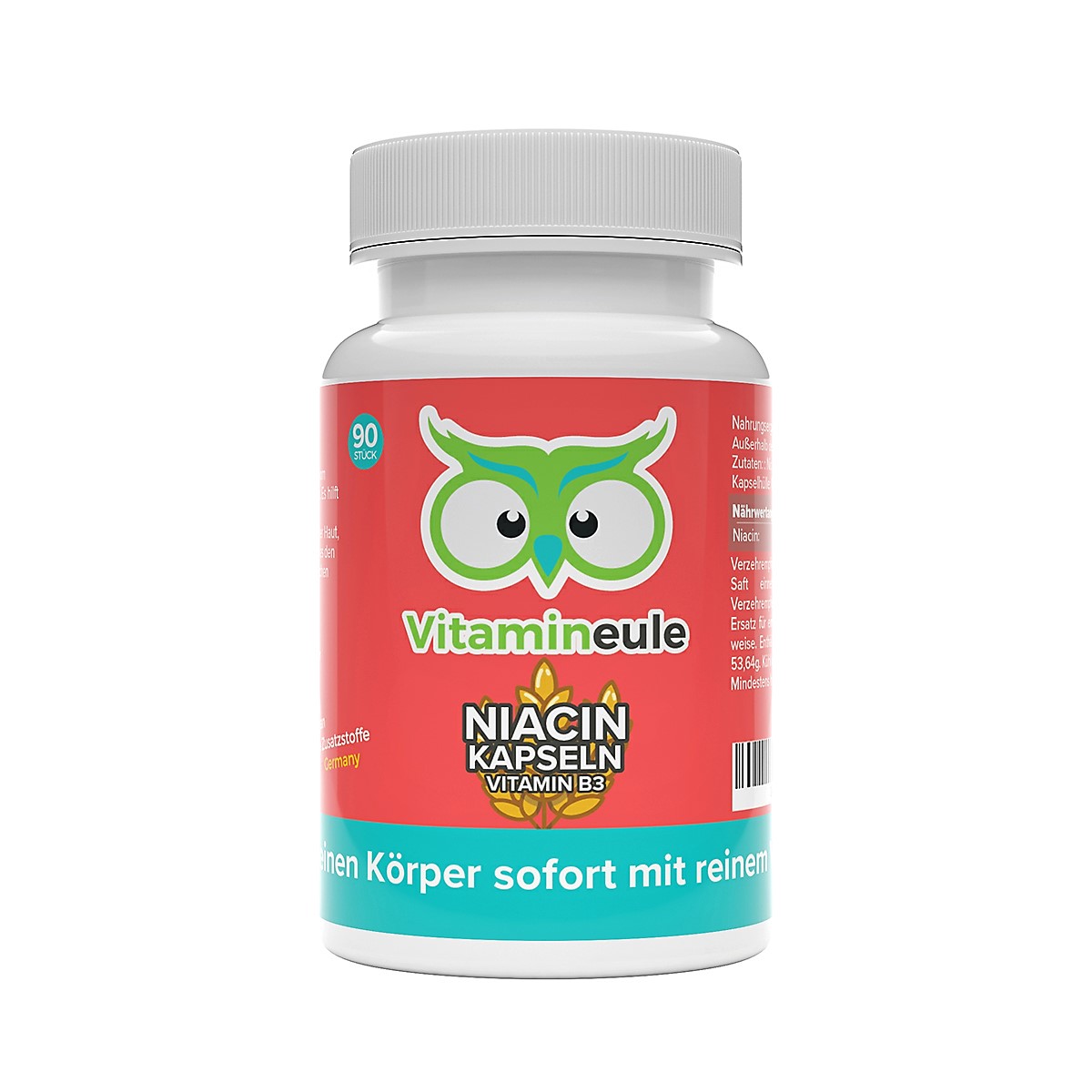

Team Vitamineule
Questions, wishes or suggestions? Simply contact us by e-mail or on Facebook.
1. the positive effect of niacin in the body
2. nicotinamide and nicotinic acid
3. development of niacin deficiency
4. symptoms & effects of niacin deficiency
7. how can I cover my niacin requirements through food?
8. how can I correctly determine a niacin deficiency?
9. cover your niacin requirement with niacin capsules or niacin tablets
Niacin is a water-soluble vitamin and belongs to the group of B vitamins. It is also known as vitamin B3 or nicotinic acid. The human body forms niacin in the liver from the amino acid tryptophan. Niacin is present in all body tissues and is essential for energy production and metabolism. It ensures that muscles, nerves, skin and DNA can recover properly. In this blog you can read about the positive effects of vitamin B3 on the human body and how you can counteract a niacin deficiency.
The positive effects of niacin in the body
Niacin is found in all tissues of the human organism and is essential for the body. Niacin participates in the reactions in all body cells such as cell division and energy metabolism. In addition, it helps to build up and break down carbohydrates, fatty acids and amino acids. Processes such as signal transmission in the cell are dependent on niacin. Niacin helps the body, muscles and the renewal of skin and nerves to recover. Especially the muscle tissue, the nervous and digestive system and the repair of the nervous system are dependent on niacin. For this purpose it supports the formation of messenger substances in the brain, which transport information between the nerve cells. Niacin is also involved in the regulation of blood sugar.
Nicotinamide and nicotinic acid
Niacin occurs in food in two different forms: nicotinamide and nicotinic acid. In the human organism these substances are combined with coenzymes. Niacin thus participates in metabolic processes such as energy metabolism and the metabolism of protein, fat and carbohydrates.
Development of a niacin deficiency
A niacin deficiency can be caused by
- a reduced ability to absorb the vitamin (e.g. by a disorder of fat digestion)
- a long lasting wrong diet or nutrition
- diseases such as anorexia
- the long-term use of certain medicines
- chronic liver damage
- Alcohol abuse
- insufficient supply (with main maize nutrition)
- Carcinoids (neuroendocrine tumours)
- long fasting
Symptoms & Effects of Niacin Deficiency
- flaky skin
- Pain and numbness in the extremities
- Skin changes
- Inflammation of the oral mucosa
- Gastrointestinal problems
- psychological changes such as concentration difficulties
The correct dosage of niacin
According to the recommendation of the German Society for Nutrition (DGE), adults should consume nicotinic acid or niacin as a vitamin of the B-complex in a daily amount of approx. 11 - 17 mg. Adolescents, as well as pregnant or breastfeeding women have the highest need for niacin. In general, however, you should know that the daily amount of the vitamin also depends on your age, sex, weight and energy requirements.
Overdose of Niacin
If niacin is taken in very high doses, various health consequences can arise. Common adverse effects are reddening of the skin on the face and arms, a feeling of heat, hives and itching of the skin, also known as flush symptoms. In addition, diarrhoea, vomiting and nausea may occur. In the opinion of the Federal Institute for Risk Assessment (BfR), one should therefore always follow the recommended intake of food supplements and not consume them in higher quantities.

How can I cover my niacin requirement through my diet?
There are numerous natural sources of niacin that you can incorporate into your daily diet. Animal products contain a particularly large amount of niacin. There are numerous vegetable foods with a high content of the vitamin, but these are less well utilized by the human organism.
A high occurrence of the vitamin is mainly found in these foods:
Animal sources: offal, salmon, herring, beef, veal, pork, eggs, milk
Vegetable sources: Nuts, dried apricots, coffee beans, wholemeal cereals
How can I correctly determine a niacin deficiency?
If you suspect a niacin deficiency, you should best consult a doctor. On the basis of your medical history and any symptoms you may have, they can determine whether you have a niacin deficiency. In most cases, the diagnosis is made clinically. Supplementing the nutrient with the help of dietary supplements usually eliminates the deficiency.
Cover your niacin requirement with Niacin capsules or Niacin tablets
If you have a balanced diet, do a lot of sports or cannot manage to ensure your daily vitamin B3 supply through your diet, you can resort to niacin capsules or niacin tablets as an alternative. Niacin tablets are often sold in local pharmacies, drugstores and supermarkets. However, in many cases these are produced with artificial additives or manufactured abroad. Niacin capsules, on the other hand, in many cases contain the active ingredient in a plant-based cellulose shell and can be produced without fillers. It is also important that the vitamin B3 preparation is manufactured in Germany to ensure a consistently high quality.
How do I avoid a niacin "flush"?
High doses of Niacin / Vitamin B3 trigger a so-called flush in many people. This is an allergic reaction in which the niacin can cause skin redness and itching. This is not dangerous, but can be avoided by choosing the right form of niacin. To avoid such a reaction, you should use Niacin "flush free". Our Vitamin Owl® Niacin capsules are 100% flush free. Due to the good tolerance of Niacin capsules, most people have positive experiences when taking them. If you want to buy Niacin capsules, you should only buy Niacin preparations without artificial additives.
Our recommendation:
Vitamineule® Niacin capsules
In our online shop you will find our niacin capsules from Vitamineule®, which are completely free of artificial additives. Our Vitamin Owl ® Niacin capsules (flush free) contain a total of 500mg pure niacin per capsule. Each can contains 90 capsules. In addition to fast & free shipping, we offer a voluntary six-month return guarantee for all products.
Conclusion
Niacin is an essential water-soluble B-vitamin and very important for energy production and metabolism. It helps you to recover your body and renew your skin and nerves. High doses of vitamin B3 can cause a flush, i.e. an allergic reaction, in many people. This is not dangerous, but can be avoided with the right form of niacin. Therefore, when buying niacin, always make sure that you choose "flush free" niacin. In general, you should always make sure that you include enough niacin in your diet. If you suffer from a niacin deficiency, it can also be remedied by taking a dietary supplement. Niacin tablets or niacin capsules without additives are particularly suitable for this.

